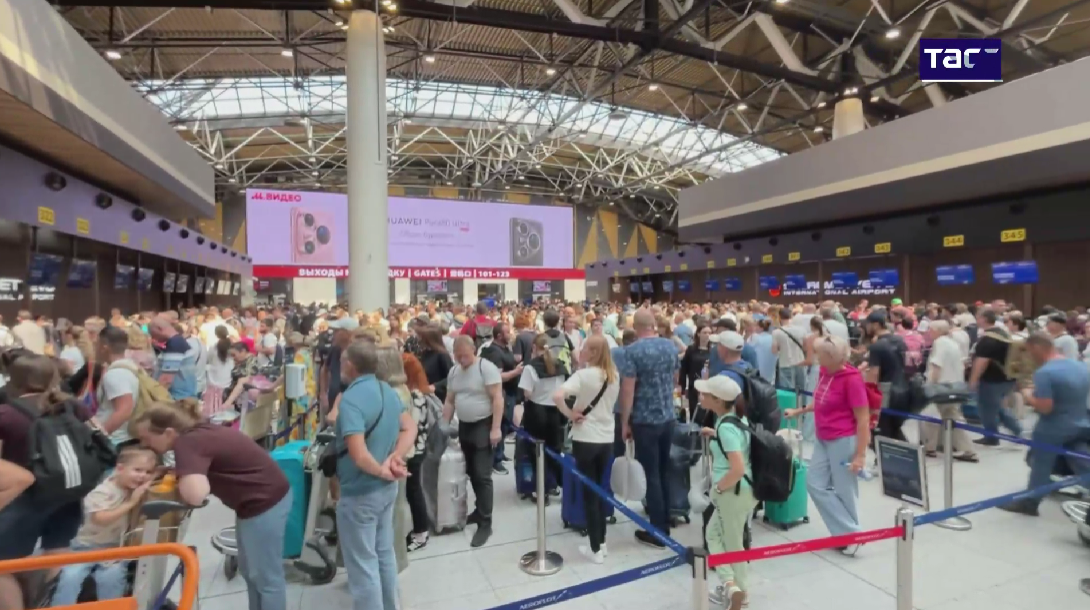The war has reached Moscow: how the attack on Aeroflot hit the middle class in Russia
28 July 17:41
Today, on July 28, Aeroflot, Russia’s largest airline, suffered a large-scale failure that led to massive flight cancellations. Hackers claimed responsibility for the incident, "Komersant Ukrainian" reported.
At least 49 flights from Moscow’s Sheremetyevo airport were canceled due to system failures. Among them are flights to Yekaterinburg, Chelyabinsk, Stavropol, Mineralnye Vody, several to St. Petersburg, as well as to Minsk, Yerevan and other cities.
The airport terminals are experiencing large crowds of passengers due to delays.
Not just a glitch
“Aeroflot explained the situation as a technical failure in its information systems.
However, it later became known that the Silent Crow hacker group, in cooperation with the Belarusian Cyber Partisans BY, had claimed responsibility for the cyberattack.
According to them, they had been working on the operation for almost a year, as a result of which they managed to gain access to the company’s internal network. They claimed to have destroyed Aeroflot’s IT infrastructure. The hackers claim to have gained access to databases with flight history, human resources management systems, and internal phone records. In addition, according to them, about 7,000 physical and virtual servers were destroyed.
Russia’s Prosecutor General’s Office confirmed that the failure in Aeroflot’s information system was caused by a hacker attack.
“Based on the materials of the prosecutor’s inspection, a criminal case was opened on the grounds of a crime under Part 4 of Article 272 of the Criminal Code of the Russian Federation (unlawful access to computer information),”
– the agency said.
Meanwhile, the Kremlin called the situation “alarming.”
“The hacker threat is a threat that persists for all large companies that provide services to the public,”
– dmitry Peskov, the presidential press secretary, emphasized.
A reminder of the war for the Russian middle class
Political scientist Vladimir Fesenko notes that for most Russians, the war still exists “on TV,” and only things like this make them feel its consequences personally.
“Apart from the fact that they can’t fly from a Russian city to go on vacation somewhere else, there is an impact on the economy, but it is not critical. This is not a factor that can stop the war,”
– Fesenko says.
However, in his opinion, the consequences for the everyday life of the middle and upper classes are more noticeable.
“Even Russian commentators themselves admit that the story with the airports is perhaps the biggest impact of the war on the daily lives of those who are used to traveling by air. Especially now, in the summer season,”
– adds the expert.
According to Fesenko, it is the aviation sector that has become the “entry point” of the war into the lives of Russians who were previously isolated by it:
“For most Russian citizens, this war exists in parallel with their lives. But the story with the airports is a reminder that the war is real.”
Fesenko notes that the reaction of Russians to the attacks varies from radicalization to growing doubts about the expediency of the war.
“Some people are growing more aggressive toward Ukraine – they believe that we need to attack even more. But others, on the contrary, think that maybe we should stop the war. According to some polls, the share of such people is slowly but surely growing,”
– emphasizes the political scientist.
According to Fesenko, in order to change the attitude of Russians to the war, its “price” should be increased in various areas – economy, transportation, and everyday life.
Читайте нас у Telegram: головні новини коротко
A real blow to centralized Russia
In a conversation with journalists, political strategist and managing partner of the National Anti-Crisis Group Taras Zagorodny emphasizes that the attacks on Russia’s air force have not only a symbolic but also a practical effect – they hit vital infrastructure.
“This is very good news, especially when it comes to Moscow. Russia is a centralized country, and all air traffic goes through Moscow or St. Petersburg. If it breaks down, the country begins to fragment,”
– explains the expert.
According to him, this affects not only passenger transportation but also strategic logistics operations:
“Imagine if you need to urgently deliver a spare part to Yamal to keep oil or gas production going. Or to deploy troops. And then there is a failure. This is a strategic threat.”
Air mattresses are a new reality for Russians
Zagorodniy also ironizes how Russians are forced to adapt to the new reality:
“Russians are already taking air mattresses with them to spend the night at the airport while waiting for a flight. The vacation started well, and perhaps it will end on a mattress as well.”
The political strategist reminds us that every day of airplane downtime costs airlines millions:
“About two weeks ago, there was a situation when the official losses of airlines reached $250 million. And an airplane on the ground is already a loss. Pilots need to be paid regardless of whether they are flying or not.”
The war is coming to Moscow – and this is dangerous for the regime
Zagorodny emphasizes that Putin used to do his best to protect Moscow from the direct effects of the war. But the situation is changing. In his opinion, the consequences may be gradual but irreversible:
“Now the war is reaching the capital. This gives rise to a controversial thought: will Putin win this war? And this is very good. Because it is in the capital that big hacks begin.”
Thus, attacks on critical infrastructure, including aviation, have not only an economic but also a psychological effect. They gradually change the attitude of a part of Russian society to the war and make them feel its consequences on their own experience. Although this will not lead to immediate changes, the cumulative effect may be important in the long run.
Читайте нас у Telegram: головні новини коротко









